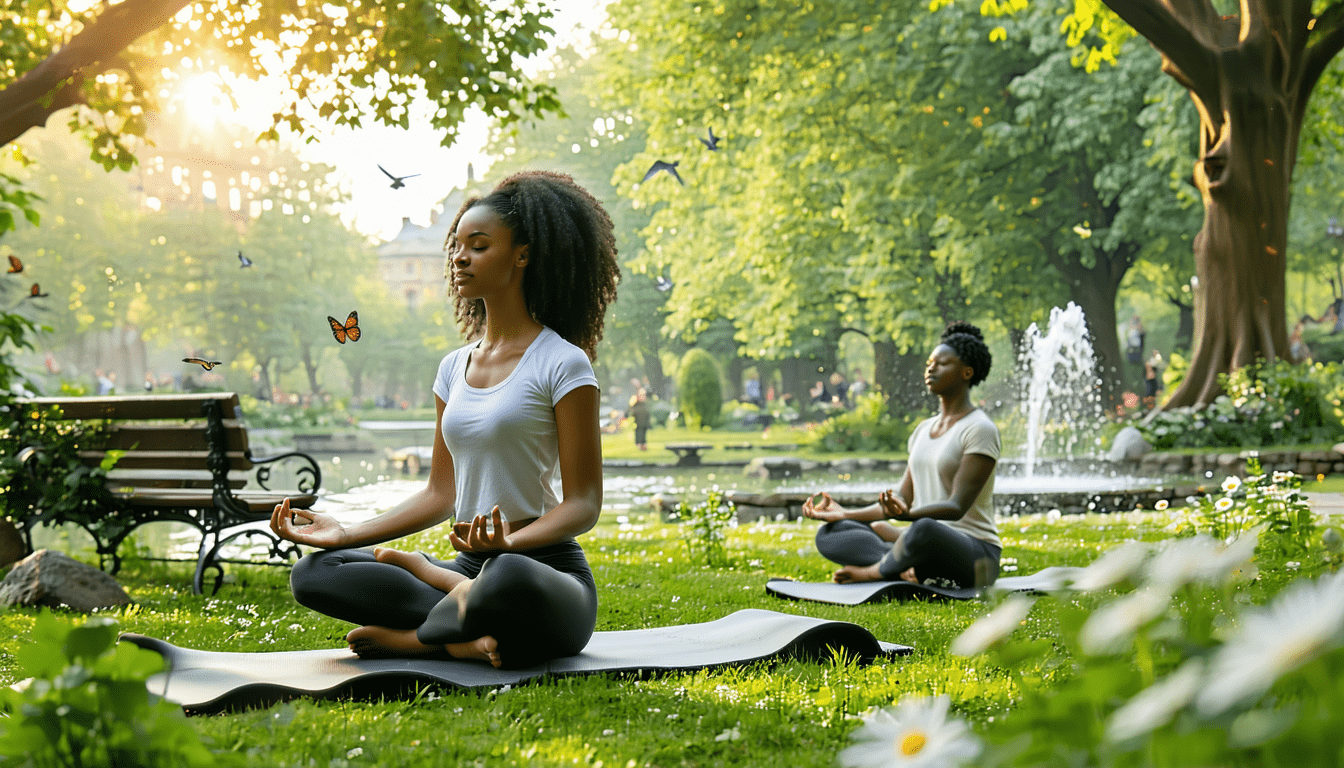|
IN BRIEF
|
Anxiety is a prevalent issue that affects countless individuals, often interfering with daily life and overall well-being. Implementing effective strategies for anxiety reduction can significantly improve mental health and enhance coping mechanisms. From understanding triggers and incorporating mindfulness techniques to practicing relaxation methods, there are various approaches to manage anxiety. By leveraging these strategies, individuals can cultivate a sense of control, promote emotional stability, and foster resilience in the face of stress.

Managing anxiety effectively requires implementing diverse strategies that can alleviate symptoms and enhance emotional well-being. This article explores several practical techniques, including breathing exercises, mindfulness practices, and the importance of a healthy lifestyle to combat anxiety. By understanding these strategies, individuals can take proactive steps towards reducing their anxiety levels and improving their quality of life.
Breathing Exercises
One of the most immediate and effective techniques to manage anxiety is through breathing exercises. Deep and slow breathing can help activate the body’s relaxation response. Techniques such as diaphragmatic breathing or the 3-3-3 rule (identify three things you can see, hear, and feel) are particularly beneficial. Incorporating these exercises into daily routines can lead to significant reductions in anxiety levels, providing individuals with a simple yet powerful tool to regain control in moments of distress.
Mindfulness Techniques
Practicing mindfulness involves focusing on the present moment and acknowledging thoughts without judgment. Techniques such as meditation and guided imagery have proven particularly effective for those dealing with anxiety disorders. Engaging in mindfulness can help individuals distance themselves from negative thoughts and reduce feelings of unease. Regular practice not only fosters a sense of calm but also enhances self-awareness, further empowering individuals to manage their anxiety.
Physical Activity
Engaging in regular exercise is another vital strategy for anxiety reduction. Physical activity releases endorphins, neurotransmitters responsible for positive feelings. Activities such as yoga, walking, or even simple stretches can act as natural stress relievers. Not only does regular exercise improve overall physical health, but it also greatly benefits emotional well-being, making it an essential aspect of any anxiety management plan.
Nourishing the Body
The connection between diet and mental health is well-established. Consuming well-balanced meals rich in nutrients can significantly influence mood and anxiety levels. Foods containing omega-3 fatty acids, whole grains, and lean proteins contribute positively to mental health. Additionally, staying hydrated and avoiding excessive caffeine can help mitigate anxiety symptoms. Making dietary adjustments is a practical strategy towards lasting anxiety reduction.
Therapeutic Techniques
Incorporating therapy into an anxiety management strategy can also yield positive results. Cognitive-behavioral therapy (CBT) is particularly effective in helping individuals challenge negative thought patterns and develop coping mechanisms. Engaging in therapy can also provide a safe space to explore personal triggers and learn to manage them in healthy ways. Whether through individual or group counseling, therapeutic techniques are invaluable in the journey towards anxiety reduction.
Complementary Practices
Many find relief in complementary practices such as aromatherapy, herbal treatments, or hypnotherapy. These approaches can further enhance relaxation and stress relief. For instance, essential oils like lavender are known for their calming effects, while herbal remedies may provide additional support. Exploring these alternative options alongside conventional techniques can lead to a more personalized anxiety management plan.
Utilizing Cannabinoids
Recent studies have shown that certain cannabinoids may offer benefits for anxiety relief. Exploring the benefits of CBD and its non-psychoactive properties can be a game-changer for some individuals. Additionally, understanding THC-free products might provide a non-intoxicating option for wellness. Individuals should consider the overall impact of cannabis on health, as well as medical marijuana options that may assist in managing anxiety symptoms.
Establishing Routine and Self-Care
Finally, establishing a daily routine and prioritizing self-care activities are crucial strategies. Allocating time for relaxation techniques, scheduling worry time, and engaging in enjoyable activities contribute to reducing anxiety. Practicing self-kindness and challenging negative self-talk is vital in promoting mental resilience and fostering a healthier mindset. By integrating these self-care practices, individuals can further equip themselves to manage their anxiety effectively.
| Strategy | Description |
| Breathing Techniques | Utilize diaphragmatic breathing to calm the nervous system. |
| Progressive Muscle Relaxation | Systematically tense and relax muscle groups to release tension. |
| Mindfulness | Focus on the present moment to reduce worrying thoughts. |
| Physical Activity | Engage in regular exercise to release endorphins and improve mood. |
| Journaling | Documenting thoughts and feelings can provide clarity and insight. |
| Visualization | Use guided imagery to create a calming mental space. |
| Self-Care Practices | Incorporate yoga, meditation, or aromatherapy into your routine. |
| Behavioral Therapy | Work with a professional to identify and change negative thought patterns. |
| Dietary Adjustments | Eat a well-balanced diet to fuel your body and mind effectively. |

Anxiety can be overwhelming, but effective strategies can empower individuals to regain control over their mental well-being. This article explores various techniques for anxiety reduction, offering clear and practical methods that can be easily integrated into daily life. Employing a combination of relaxation practices, mindfulness, and cognitive restructuring can significantly enhance emotional health and resilience against stress.
Relaxation Techniques
Practicing relaxation techniques is crucial for reducing anxiety levels. Activities such as yoga, meditation, and even simple breathing exercises can help calm the mind and body. For instance, diaphragmatic breathing allows individuals to focus on their breath, promoting relaxation and grounding one’s thoughts. Additionally, engaging in relaxing activities such as a massage or aromatherapy can further nurture tranquility.
Mindfulness and Staying Present
Being present at the moment is a powerful way to combat anxiety. Techniques such as mindfulness meditation can help individuals learn to observe their thoughts without judgment, fostering a greater sense of awareness. This practice teaches individuals to appreciate the current moment, aiding in the reduction of anxiety about future uncertainties.
Cognitive Restructuring
Challenging negative self-talk is an essential strategy for managing anxiety. By recognizing unhelpful thoughts and replacing them with more positive affirmations, individuals can shift their perspective. This process of cognitive therapy helps to break the cycle of anxiety by restructuring the way one thinks about specific triggers. It empowers individuals to confront fears through small acts of bravery, encouraging personal growth.
Physical Activity
Regular exercise is not only beneficial for physical health but also plays a significant role in mental well-being. Activities such as walking, running, or engaging in a fitness routine can release endorphins, which are natural mood lifters. Incorporating physical activity into one’s daily routine can serve as an effective anxiety management tool.
Journaling as a Coping Method
Writing in a journal can be a therapeutic way to manage anxiety. This practice allows individuals to articulate their feelings and thoughts, serving as an emotional outlet. Keeping track of worries in a structured manner can help in identifying patterns, allowing for reflection on one’s triggers and responses. Subsequently, journaling aids in developing cognitive awareness, enhancing self-care.
Dietary Adjustments for Anxiety Management
Nutrition plays a vital role in managing anxiety. Consuming a well-balanced diet rich in nutrients is important for overall emotional health. Foods high in omega-3 fatty acids, antioxidants, and whole grains can reduce anxiety symptoms. Furthermore, avoiding excessive caffeine or sugar may diminish feelings of restlessness and anxiety.
Supportive Therapies
Considering therapies such as behavioral therapy and exploring the benefits of CBD can provide supplementary support for individuals dealing with anxiety. These approaches may offer significant relief and a different perspective on handling distress. For information about the holistic benefits of hemp-derived products, individuals can consider different options that promote wellness.
Incorporating a variety of strategies can empower individuals to manage their anxiety effectively. Each person’s journey in reducing anxiety is unique, and experimenting with different techniques can lead to discovering the most beneficial approaches. By embracing relaxation practices, mindfulness, healthy eating, and supportive therapies, individuals can foster a healthier mindset and a more fulfilling life.
- Deep Breathing: Practice diaphragmatic breathing to calm your nervous system.
- Mindfulness: Stay present and aware, reducing unnecessary worries.
- Exercise: Engage in regular physical activity to release endorphins.
- Journaling: Write down your thoughts and feelings to process emotions.
- Progressive Muscle Relaxation: Tense and relax muscles to alleviate stress.
- Visualization: Use guided imagery to create a sense of calm.
- Small Acts of Bravery: Gradually face fears to build confidence.
- Aromatherapy: Use essential oils for their calming properties.
- Plan Worry Time: Designate specific time for concerns to contain anxiety.
- Kind Self-Talk: Replace negative thoughts with encouraging phrases.
Anxiety can be a debilitating condition that affects daily life in various ways. However, numerous effective strategies can help manage anxiety and promote emotional well-being. By adopting these techniques, individuals can regain control, reduce symptoms, and foster a more resilient mindset.
Mindfulness and Relaxation Techniques
Mindful Breathing
One of the simplest yet most powerful methods for managing anxiety is through mindful breathing. This technique involves taking deep, slow breaths to calm the mind and body. A common practice is the diaphragmatic breathing technique, where you inhale deeply through the nose, allowing your abdomen to expand, then exhale slowly through the mouth. This method not only reduces anxiety levels but also helps in grounding oneself in the present moment.
Progressive Muscle Relaxation
Progressive muscle relaxation involves systematically tensing and then relaxing each muscle group in the body. Start from the toes and move upward, focusing on the sensation of tension followed by relaxation. This exercise increases body awareness and can significantly alleviate physical symptoms of anxiety.
Therapeutic Practices
Visualization Techniques
Visualization techniques harness the power of imagination to reduce anxiety. By picturing a calm and serene environment, individuals can transport themselves mentally to a place of peace. This mental imagery can involve envisioning a favorite beach, a serene forest, or any space that feels safe and comforting.
Journaling
Keeping a journal is an effective method to process emotions and thoughts. Writing about one’s feelings helps to externalize anxiety, making it easier to understand and confront. It also enables individuals to track triggers, providing insight into patterns of anxiety and potential coping mechanisms for the future.
Physical Activity
Exercise Regularly
Engaging in regular physical activity is a proven way to alleviate symptoms of anxiety. Exercise releases endorphins, chemicals in the brain that act as natural painkillers and mood elevators. Activities such as yoga, walking, or any form of aerobic exercise can compel individuals to focus on the physical aspects rather than their anxious thoughts.
Healthy Eating
Your diet plays a crucial role in managing anxiety. Consuming well-balanced meals rich in whole foods can positively impact mood and energy levels. Avoiding processed foods and excessive caffeine can help maintain a stable emotional state. Incorporating foods rich in Omega-3 fatty acids, such as salmon and flaxseeds, can also contribute to reduced anxiety.
Behavioral Strategies
Challenge Negative Thoughts
An important component of managing anxiety is learning to challenge negative self-talk. By recognizing and reframing these thoughts, individuals can reduce their anxiety levels. Practice cognitive behavioral techniques by questioning the validity of anxious thoughts and replacing them with positive affirmations.
Plan Worry Time
Designating a specific time to address worries can help contain anxious thoughts. This method, known as worry time, allows individuals to set aside a few minutes each day to process their concerns, rather than allowing anxiety to take over throughout the day. By doing so, it becomes easier to focus on the present and engage fully in daily activities.
Self-Care Practices
Aromatherapy and Massage
Aromatherapy and massage are holistic approaches that can significantly reduce stress levels. Using essential oils like lavender or chamomile can create a calming atmosphere and induce relaxation. Regular massages can loosen tense muscles, alleviate physical symptoms, and promote overall well-being.
Seek Professional Help
If anxiety becomes overwhelming, it’s crucial to seek professional assistance. Therapists can offer valuable support through therapy modalities, including cognitive behavioral therapy and exposure therapy, tailored to individual needs. Medications may also be explored under the guidance of a healthcare provider.
Frequently Asked Questions about Effective Strategies for Anxiety Reduction
What are some quick techniques to manage anxiety? Techniques such as slow breathing, progressive muscle relaxation, and mindfulness practices can be effective in managing anxiety quickly.
How can I practice relaxation effectively? Activities like yoga, meditation, and visualization techniques are excellent methods for inducing relaxation and reducing anxiety.
What role does diet play in managing anxiety? A balanced diet can significantly impact anxiety levels. Foods rich in nutrients can help improve mood and overall well-being.
Is exercise beneficial for anxiety reduction? Yes, regular exercise has been shown to alleviate symptoms of anxiety and promote healthier mental well-being.
What is the purpose of journaling in anxiety management? Keeping a journal allows individuals to track their thoughts and feelings, which can help identify triggers and patterns related to anxiety.
Can therapy help manage anxiety? Seeking help through behavioral therapy or cognitive therapy can provide valuable strategies for coping with anxiety and changing negative thought patterns.
What is “worry time,” and how does it work? Planning a specific time to acknowledge your worries can help prevent them from becoming overwhelming throughout your day.
Are relaxation techniques like aromatherapy effective? Many individuals find that aromatherapy and other holistic approaches, such as massage, can aid in reducing anxiety.
How do I identify my anxiety triggers? Understanding and tracking your feelings and circumstances can help you pinpoint specific triggers that provoke anxiety, allowing for better management strategies.
What is the significance of being kind to oneself when dealing with anxiety? Practicing self-kindness can foster a supportive inner dialogue, which is crucial for managing anxiety effectively.



